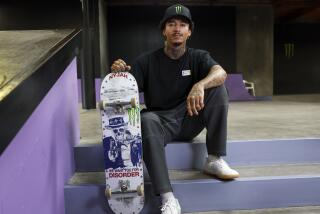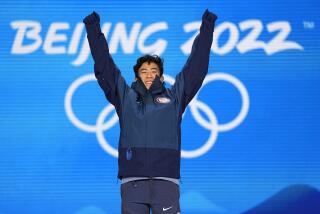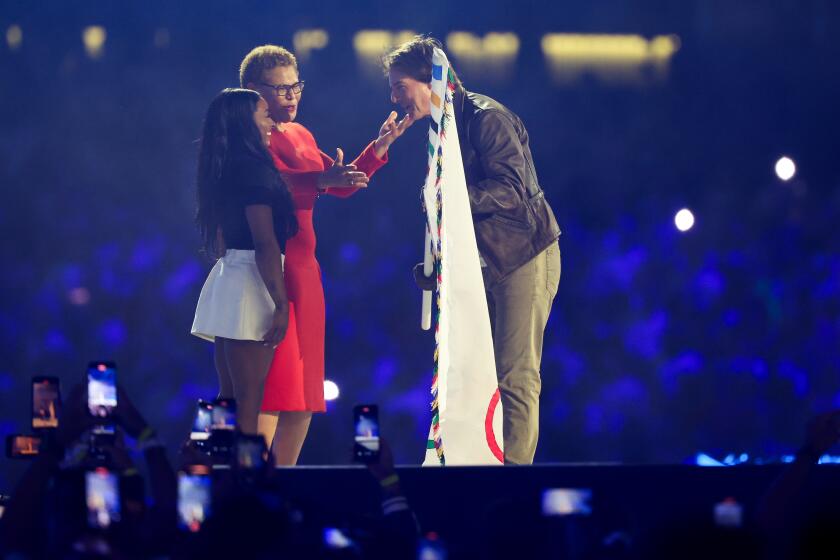It’s Just the Beginning for Yagudin
Coming off perhaps the greatest year any male figure skater has had, Alexei Yagudin is just getting started.
In the afterglow of a season that brought victory in every major competition, including Olympic gold and his fourth world championship, Yagudin has no thoughts of leaving competitive skating. He plans to spend more time than ever on the ice this summer on three tours, then compete in Skate America and Skate Canada during the fall.
Beyond that, he is not making any commitments, although it sounds as if the major events--the Grand Prix final in his native Russia and worlds in Washington--remain very enticing.
Yagudin, 22, laughs when told he sounds just like U.S. skating icon Michelle Kwan, who also expects to remain Olympic eligible--at least for the near future.
“I just want to do my job and it is really great that I like my job so much and what I am doing,” Yagudin says. “Michelle also has been a four-time world champion, and I can understand how she is still competing and fighting. Sometimes you have got everything and it doesn’t matter. She still pushes on. So do I.
“At some time, you realize you have everything in skating, and now you must skate for the people and take that role more seriously. That is how I feel.”
Just a few years ago, Yagudin was considered something of a rebel. He even was thrown off the Champions on Ice tour by promoter Tom Collins after the skater made off-color remarks to a security guard at a show in New York, then offended a reporter in Denver.
But Yagudin has grown up and grown into the world’s most popular men’s skater. He not only will return to and headline Collins’ tour, he is on the Skate The Nation and Stars on Ice shows in Canada.
He has impressed everyone with his maturity and versatility, both characteristics that defined his unbeaten season.
“He has a great quality,” says 1988 Olympic champion Brian Boitano. “He moves across the ice very effortlessly--he almost floats on top of it. He is very talented and well-rounded.”
Yagudin is taking his status quite seriously. Unlike his predecessors as Olympic champion, Alexei Urmanov and Ilia Kulik, who quickly disappeared from the competitive scene, Yagudin understands he is the leader of a highly skilled generation that appears ready to stretch the boundaries of the sport.
He talks about performing once-outlandish moves such as a quadruple axel or even a quad-quad combination. He wants to expand his musical horizons, perhaps incorporating hip-hop and other modern pieces, not using just classical themes.
And he embraces the responsibility of his position atop the skating world.
“Of course, I am more popular now because of I won the Olympics,” says the third straight Russian gold medalist. “I want to skate and not disappoint people for the competitions and the shows on tour. I know it will be more serious off the ice, more responsibility as a skater, and I look forward to it. I am the way I am and I will not change myself because of the Olympic gold.”
Yagudin, who also is about to write his autobiography, doesn’t expect to have time to change his programs for next season. Of course, the way he skated to “Winter” for his short program and “The Man in the Iron Mask” for his free skate, why alter anything?
Drastic change was necessary heading into the Olympic season. Yagudin was coming off a miserable year in which he had back and leg injuries and was surpassed by countryman and rival Evgeny Plushenko. When Yagudin finished a weak third at the Goodwill Games last summer, he knew extreme measures were in order.
That included losing nearly 20 pounds as part of a rigorous training regimen, and rededicating himself to his sport.
“The year before was like hell for me,” he says. “I felt I was doing everything, but I couldn’t get it the way I wanted for the competition. Even if I skated good, the practices were not great.
“After Goodwill Games, I worked more and became more concentrated on skating. I realized you can’t be perfect all the time, that there are good and bad parts of your life and you have to pass that bad time. It was a test to see how you handle the pressure and losing the world title.
“I’d been on top of the world for three years and it’s hard to handle that, with all the people expecting you to skate good all the time. You are human and sometimes do mistakes. The best way to handle it is not to change yourself.”
For now, it’s time to enjoy the rewards of a very special year.
“That is why I was working to get the Olympic title,” he says. “It all pays off. You have a dinner and you get the dessert at the end. I am getting the dessert.”
More to Read
Go beyond the scoreboard
Get the latest on L.A.'s teams in the daily Sports Report newsletter.
You may occasionally receive promotional content from the Los Angeles Times.








